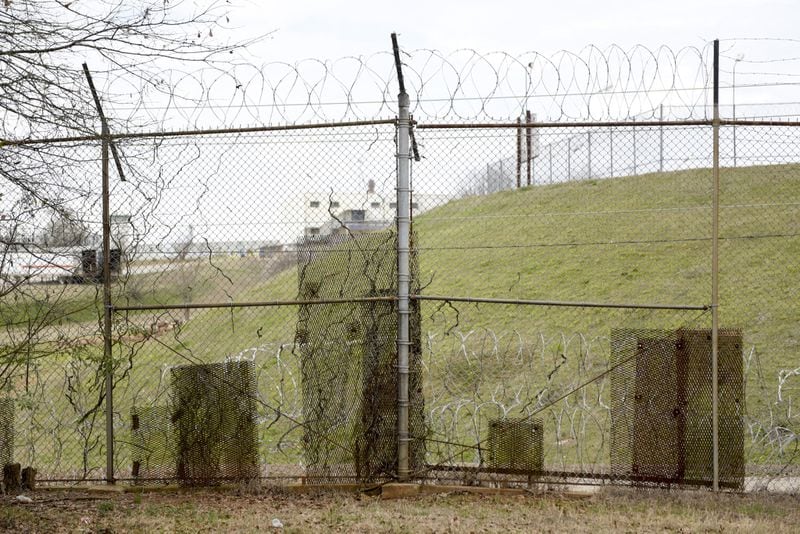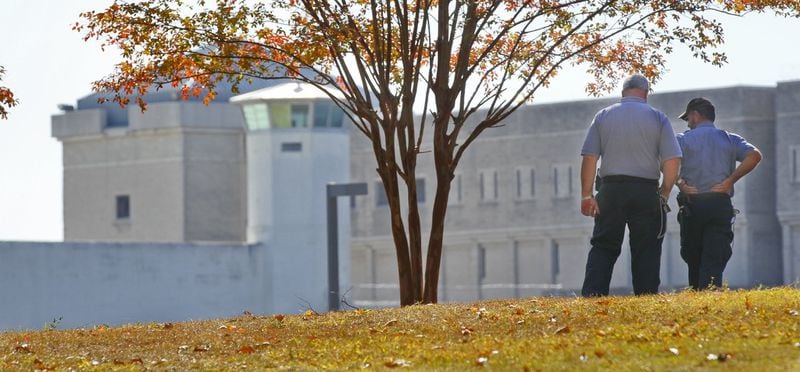I’ve been debating with a fellow AJC reporter how to describe the atmosphere at the federal prison camp here in Atlanta, the place where inmates have lived a bacchanal of drugs, booze and heaps of rich, delicious food.
I have likened the atmosphere to the prison scene in "Goodfellas," where Paulie and his crew of well-connected mobsters gorge themselves on a feast of epic proportions with smuggled-in goodies.
Reporter Rhonda Cook, who has banged out some excellent stories on this mess, says it’s more like “Hogan’s Heroes,” with the roles of the clueless German guards provided to you by Uncle Sam.
Whatever you think about it, the government should be lauded for its truth in advertising about the camp being a minimum security facility. Because security there is all but non-existent.
The story, crazy at first, has turned increasingly bizarre.
On Feb. 3, the FBI and Atlanta police snagged a prisoner there sneaking back in through the fence after a shopping run. His duffel bag contained a cellphone, scissors, two 1.75 liter bottles of Jose Cuervo tequila, two cartons of Newport cigarettes, four boxes of Black and Mild cigars and food.
The Atlanta cops had staked out the area and set up video cameras there because they have known — for years — that prisoners there like to sneak out to improve their quality of life.
In fact, neighbors in nearby apartments have often complained about the stream of prisoners slipping away.
In January 2013, an Atlanta cop saw four men in ski masks sitting in a car outside the prison camp matching the description of robbery suspects. Suddenly, the four men spotted the police, so three of them ran to the fence, scaled it and escaped into the prison camp.
The fourth drove off and ditched the stolen car. It contained: five cases of Bud Light, three cases of whiskey, 24 cellphones and two loaded handguns. The cop contacted the prison and the FBI.
What the feds did between that night in 2013 and this month remains a mystery because they aren’t talking despite many requests for comment. In fact, we’ve found out more about the operation from the inmates themselves.
That’s right. From the inmates.
After her first story about the prison camp, Rhonda got an email from a man wanting to talk about the situation there. She assumed it was from a relative, but the fellow corrected her. "No, I'm in the prison," he said.
After struggling to email back and forth with his substandard phone, the fellow asked, “Wouldn’t it just be easier to talk?”
Sure, it would. So he called Rhonda and explained how there were very few guards and 500 prisoners, and how they knew where the guards were at all times, and how teams of "ninjas" cut holes in the fence, and how lookouts stood by to monitor things, and how the guys from the gathering teams would call back to their prison buddies to make sure the coast was clear as they returned with bags of loot.
“The back units are the party units,” the inmate said, referring to the dormitories in the rear of the facility. He added, “I have to stop and think, ‘Am I really in prison?’”
He showed photos and videos of beer and cocaine parties. On one tape, an inmate was heard saying, “This is a neat place to be at.”
The inmate described his colleagues using electric grills and deep fryers and slapping together feasts that would shame some Midtown eateries.
After the second story ran this week, our prison mole typed out a message: “Let’s see what happens the warden is having a meeting with the staff today people were drunk last nite I was smoking weed business as usual …”
Once again, they're partying like it's 1999 after two AJC front-page stories have run and as a federal investigation continues.
I called Vance Bryant, a guard at the facility for 15 years and head of the correctional officers’ union. He was not surprised at the brazenness.
“From the outside looking in, you’re flabbergasted,” he said. “But for those who work here, it’s nothing new. It’s ‘Here we go again.’”
In fact, I related to Bryant a story I wrote 11 years ago about Dr. W. Sherrod Milton, a silver-tongued preacher/flimflam man who operated a group of financial businesses in a Peachtree Street office suite and rang up nearly $20 million in mortgage fraud.
Oh yeah, he was also an inmate at the Atlanta federal prison.
Bryant laughed, saying he recalled Milton. “Each time we get one of these, there’s a response — and then you go back to status quo.”
The veteran guard said the prison camp is woefully understaffed and prisoners with lots of time on their hands know how to game the system.
In fact, he said very few minimum security facilities in the federal system have fences.
“They put up the fences here in the ’90s not to keep the prisoners in, but to keep the public out. They were coming in for visits, their girlfriends and that. Usually federal prison camps don’t have fences. They’re out in the woods. There’s nowhere for (prisoners) to go.”
I asked him about the mindset of the inmates.
He said, “They are like, ‘It’s our job to do this and it’s your job to catch us.’”
Everybody has his role in life, I guess.
As the week ended, the prisoner/correspondent wrote to Rhonda, saying, “things are on fire, extreme fire, lol.” So he was ditching his phone because of the “massive shakedown” sure to come.
He apparently was a fan of journalism and congratulated Rhonda, saying, ” you did a wonderful job.”
Why’d he step forward?
“The federal government teaches you to snitch,” he wrote. “OK, well, I did. I just did it on them.”
Consider the feds busted.










